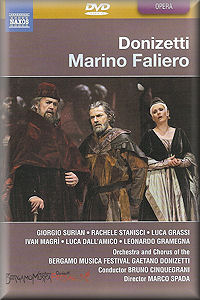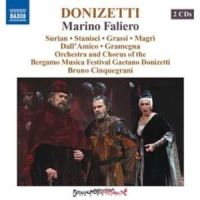 |
 |
|


alternatively
DVD: MDT
AmazonUK
AmazonUS


alternatively
CD: MDT
AmazonUK
AmazonUS
Sound
Samples & Downloads (CD)
|
Gaetano DONIZETTI (1797-1848)
Marino Faliero - Tragic opera in three acts (1835)
 Marino Faliero, elderly Doge of Venice - Giorgio Surian (bass);
Elena, his wife, in love with his nephew - Rachele Stanisci (soprano);
Fernando, Marino’s nephew - Ivan Magrì (tenor); Israele Bertucci,
Captain of the Arsenal - Luca Grassi (baritone); Steno, a young
patrician member of the Council of Forty - Luca Dall'Amico (bass-baritone);
Leoni, member of the Council of Ten - Leonardo Gramegna (tenor)
Marino Faliero, elderly Doge of Venice - Giorgio Surian (bass);
Elena, his wife, in love with his nephew - Rachele Stanisci (soprano);
Fernando, Marino’s nephew - Ivan Magrì (tenor); Israele Bertucci,
Captain of the Arsenal - Luca Grassi (baritone); Steno, a young
patrician member of the Council of Forty - Luca Dall'Amico (bass-baritone);
Leoni, member of the Council of Ten - Leonardo Gramegna (tenor)
Orchestra and Chorus of the Bergamo Musical Festival Gaetano Donizetti/Bruno
Cinquegrani
Director: Mario Spada; Set and Costumes: Alessandro Ciammarughi;
Video Director: Matteo Ricchetti
Filmed: Teatro Donizetti, Bergamo, Italy, 31 October, 2 November
2008
Picture format: NTSC 16:9. Sound format: PCM 2.0, Dolby Surround
5.0, DTS 5.0.
Menu language: English; Subtitles: English and Italian
Performed in the Critical revision by Maria Chiara Bertieri for
BMG Ricordi Music Publishing
 NAXOS
NAXOS  2.110616-17 [73.27 + 78.48]
2.110616-17 [73.27 + 78.48]
8.660303/4 [72.40 + 71.44] 
|
|
|
A rhetorical question; when is good not good enough? In the
case of Donizetti’s Marino Faliero it was when it was
up against Bellini’s I Puritani premiered in the same
theatre and with the same principal singers six weeks before
in the winter of 1835. According to the booklet essay, it was
Donizetti’s fiftieth opera. My list says his forty-sixth and
the New Grove a different figure. It’ not that some of us cannot
count but rather what constitutes a new opera. Donizetti famously
re-worked the music of Maria Stuarda into Buondelmonte.
This was after the King of Naples banned the former, at very
short notice, after hearing about the scene between the two
Queens and the physical scrap between the divas that ensued!
I count that as one opera, others as two.
Donizetti and Bellini had first featured together in the Milan
season at the Teatro Carcano in the winter of 1830 when a group
of bankers tried, but failed, to take over the franchise of
La Scala. The bankers had signed up both composers, Felice Romani
the then leading librettist, and a cast of singers including
the leading tenor of the day, Rubini, and the formidable soprano
Giuditta Pasta. Both composers hit the high spots with Anna
Bolena and La Sonnambula respectively, works which
guaranteed each a successful future. Donizetti was the more
prolific often composing and presenting three or four new works
each year. By the time the two composers featured, at Rossini’s
invitation in the 1835 season at the Théâtre Italien,
Paris, Donizetti had presented nineteen operas whilst the
often ailing Bellini managed a mere three. Rossini had gathered
a formidable group of principal singers for the season. These
included the baritone Tamburini and bass Lablache as well as
Rubini and Pasta. This fabulous quartet became known as The
Puritani Quartet as they toured Bellini’s work to London.
Over several seasons they reprised it in Paris, achieving the
singers’ great fame and fortune along the way. Whilst Donizetti
went on to compose a further twenty-two or so operas before
being overtaken by the consequences of tertiary syphilis in
1848 at the age of fifty-one. He was in a comatose state for
the last years of his life. I Puritani was Bellini’s
last opera, he died suddenly six months after the premiere shortly
before his thirty-fourth birthday. There would be no more rivalries
between the two.
Each composer attended the premiere of the other’s opera, so
Donizetti knew what he was up against in terms of music and
audience response. He set a more dark and dramatic libretto
with no happy ending. The story is loosely based on historical
fact of Marino Faliero, an elderly Doge of Venice, who was executed
for plotting to make himself a Royal ruler; an aspiration not
unknown in the Paris of 1835! Marino Faliero was Donizetti’s
first opera for the Théâtre Italien. He tempered
his compositional style towards the French model. Its immediate
successor in the Donizetti oeuvre is Lucia di Lamermoor,
the most romantic and melodic of all his works and very much
in the tradition of Italian opera at the time. Despite being
somewhat overshadowed by Bellini’s opera, Marino Faliero
enjoyed a long and successful run of international performances
throughout the 19th century before disappearing from the stage
until its modern revival in 1966.
This performance from the Bergamo Festival was based in the
town where the composer was born and died. It is set in period
costume and in an evocative and imaginative set, when one can
see it that is. Even allowing for the fact that much of the
plotting goes on at night the stage scene is often under-lit.
The presentation of both the DVD and CD issue has the long act
1 on the first disc with acts 2 and 3 on the second. Thankfully
this issue is by Naxos so that on the DVD the Chapter divisions
are generous and in number sequence, unlike those on the Dynamic
Label from Italian Festivals. Artist profiles are another welcome
virtue to go alongside an informed and informative introductory
essay, and the full list of Chapter and Track divisions and
timings.
As to the singing, not many of these soloists would compete
with the original quartet, but there are not many around that
could. As the ageing Doge the Croat bass Giorgio Surian is an
excellent actor and whilst having moments of vocal unsteadiness,
he has been around for many years, creates a viable character
whose dignity is impressive. Luca Grassi as leader of the anti-patrician
insurrection, Israele Bertucci, acts the role with conviction
and sings with good expression if a little dry of tone. As the
Doge’s wife, who fancies something younger in the form of her
husband’s nephew, Rachele Stanisci, lacks the ideal weight of
voice but is expressive and in tune. Her soft singing in the
last act is especially noteworthy. As her would-be lover, Ferrando,
Ivan Magri has to attempt the high notes written for Rubini,
famous for his skill in the highest tessitura and range. He
fails in this test, although the enthusiastic applause at his
curtain made me wonder about my critical judgement until I repeated
his efforts in the act 2 aria and cavatina, which Rubini had
to encore at the premiere. I find Magri’s tone rather bleaty
and dry.
The conducting of Bruno Cinquegrani is well paced and the chorus
vibrant and involved. It being Paris a ball scene and some dancing
was de rigueur. The trouble with this brings me back
to the stage picture and lighting. Whilst the patterned centre
of the stage, often a point of focus, comes into its own in
the final act as it opens to allow the prisoners to emerge for
their execution. However, as elsewhere, and as with the dancing,
it is so poorly lit as to negate the effect.
A full libretto, in Italian is available at the Naxos
website.
Robert J Farr
see also reviews by Robert
McKechnie and James
Zychowicz
|
|












